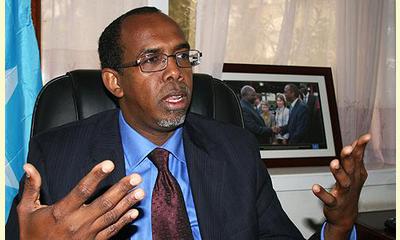|
|
Renewed optimism as Somalia marks 52 years of independence
un article par Mohamed Ali Nur
Wherever the camel goes, that is Somalia. So states an ancient Somali proverb, illustrating the strong ties that bind the people of Somalia across the globe to their homeland. And every year, on July 1, we come together to mark the anniversary of our independence.

Mohamed Ali Nur (photo from hornofafrica.abdikarim.blogspot)
click on photo to enlarge
All too often over the last two decades, these colorful celebrations have been overshadowed by the reality of conflict and suffering in Somalia. In contrast, today the atmosphere is charged with hope and expectation following the remarkable achievements that have been realised on the security, economic, and political fronts.
In Mogadishu, which is fast losing the moniker ‘Most Dangerous City In The World’, residents will take advantage of the longest sustained period of relative peace the city has experienced since 1991 to perhaps enjoy a day on the city’s crowded beaches or to take a meal in newly opened restaurants or may opt to shop in the bustling markets.
That much of this would have been unthinkable a year ago is proof of how much things have changed. With the support of African Union troops, the Somali National Army has liberated large parts of the country, including the capital, from the brutal rule of Al Qaeda affiliated terror group, Al Shabaab. In the wake of these military successes, the process of political reconciliation has been galvanised.
The Somali leadership has come together and agreed on a roadmap to end the seemingly interminable transition process and to inaugurate a new political order rooted in the aspirations and values of our people.
As we speak, an official draft of a provisional constitution, representing the views of a cross- section of Somali society, has been agreed. Traditional elders are currently meeting in Mogadishu to appoint delegates to a National Constituent Assembly, which will be charged with its adoption.
Further, the elders will appoint members of a new and reformed Parliament whose numbers have been reduced by half. This streamlined Parliament will elect a new Speaker as well as the President, and oversee the creation of a new government, finally lowering the curtain on 12 years of transition.
While much has been achieved, much more remains to be done.
The new government will have to shoulder the weighty responsibility of liberating the rest of the country, establishing the rule of law and creating the necessary conditions to allow for popular participation in decision-making.
As the terrorists are rolled back, the government must continue to take a leading role in helping establish peace, foster reconciliation and develop the structures for accountable and efficient local and regional governance. In this regard, a National Stabilization and Security Plan hinged on the continuing work to rebuild the national army, police force and institutions of justice has been devised and is being implemented, supported by a policy and strategy to reconcile communities which emphasises inclusivity and traditional Somali reconciliation processes.
Peace committees have been set up in the regions and districts of the country whose mandate is to foster a culture of peace and dialogue. These local processes will be tied to the national process to ensure that they adhere to principal national agreements.
(This article is continued in the discussionboard)
|








|
DISCUSSION
Il n'y pas encore de question liée à cet article.
* * * * *
Commentaire le plus récent:
(The following is continued from the main article listed above.)
Following this, and once the security situation on the ground allows for effective popular participation, a nationwide referendum and general election will allow the Somali population to have their say on a final Constitution and Government.
Given the duration and complexity of the conflicts in Somalia, the process will doubtless be difficult and there will be bumps along the way. The continuing engagement of the international community will be crucial in helping Somalia achieve peace and stability.
We remain thankful for the bilateral and multilateral support we continue to receive from our partners in the international community. We are also particularly indebted to our brothers and sisters in Amisom, whose efforts and sacrifice have been critical in affording us this moment of opportunity.
I would also especially like to thank the people and Government of Kenya for the hospitality they have shown to the thousands of refugees from Somalia. I offer my condolences, on behalf of the Somali people, for the recent spate of despicable terror attacks that have killed and injured several people at the Coast, Nairobi and North Eastern regions.
In conclusion, as Somalia marks 52 years of independence, we the people of Somalia once again stand at the dawn of a new era of stability and prosperity. Together with our friends in the international community, must rededicate ourselves to ensuring that anarchy and chaos at home will never again mar our observance of this great occasion.
The writer is Ambassador Extraordinary and Plenipotentiary and Permanent Representative to the Unep and UN Habitat

|
|









